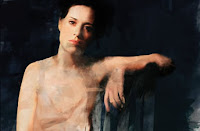 |
| Doctor No |
We start with the newly knighted Sir Colenso Ridgeon being asked to save both the life of a penniless doctor who tends the poor, and a brilliant but feckless artist with a seductive wife. Ridgeon's premises can house only one. He is friends with the former and enraptured by Jennifer Dubedat, the wife of the latter. Which is the better legacy - healing the sick, or creating works of greatness for perpetuity? At a time when such choices are forced on the medical profession with directives limiting cataract operations to one eye only, and the legal lifestyle choices of individuals are used against them in the scrum for care, Ridgeon's vacillations are a reminder that medical advances don't automatically enhance outcomes.
Nadia Fall's production emphasises the formal. The vast set - a stunning recreation of a central London consulting room that morphs elegantly into a terraced dining area, an artist's studio, and a private gallery - is the perfect backdrop for a group of self-serving numpty consultants with vigorous facial hair and well pressed frock coats. But the pace at which Shaw's verbose ruminations are delivered is so slow, homage is paid to every punctuation mark. After a stupefying first half the second dispenses with conjecture, providing more action and gifting actors and audience with the light and shade required to showcase the play's wit and humour.
In conclusion: Shaw is a bit of a head-banger if you like to ponder the meaning of a play for yourself and the ending, while challenging expectation, is unsatisfactory. Best suited to Shaw fans and doctors.
References
Henry Hitchings review in The Evening Standard
No comments:
Post a Comment